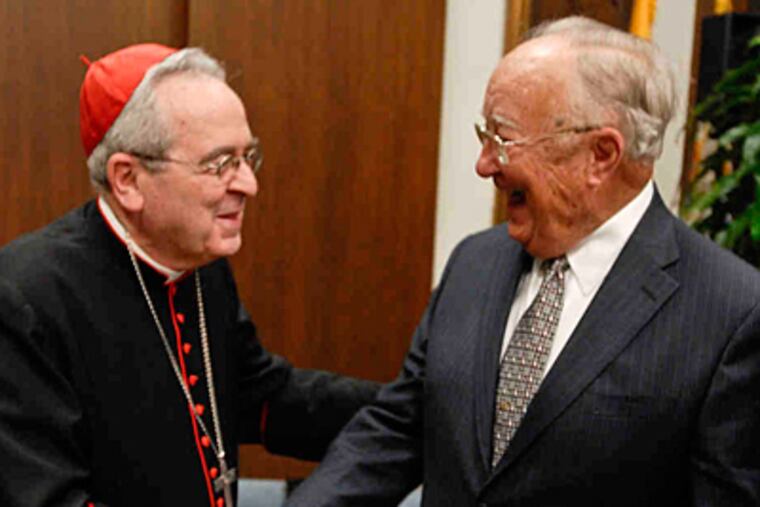Philadelphia Roman Catholic Archdiocese picks panel to study schools
As part of a "major initiative" to revitalize Catholic identity and practice in the Archdiocese of Philadelphia, Cardinal Justin Rigali has appointed a "blue-ribbon" panel to explore ways to enhance the region's Catholic schools.

As part of a "major initiative" to revitalize Catholic identity and practice in the Archdiocese of Philadelphia, Cardinal Justin Rigali has appointed a "blue-ribbon" panel to explore ways to enhance the region's Catholic schools.
In a challenge similar to those facing many dioceses, the archbishop told a news conference Tuesday, the schools in his five-county archdiocese are at a "crossroads" because of "changing demographics, declining enrollment, and a struggle to keep [education] affordable."
Comprising 17 business leaders and educators, the panel is charged with developing a plan "to assure the sustainability of Catholic education" that takes into account "demographics, staffing, facilities, and financing." Its report is expected in September.
The archdiocesan school system educates 67,000 youngsters at 167 parish schools, 17 high schools, and four special-education schools.
At its peak in 1965, enrollment numbered 265,000.
The archdiocese has made several attempts in recent years to promote Catholic schools, including a $500,000 marketing campaign in 2007 called "Keeping Faith in Mind" that touted the quality of its education and values.
Despite these and private efforts to fund tuition scholarships, enrollment has declined about 25 percent in the last decade, with the largest drop in inner-city parishes, many of whose pupils are not Catholic.
Bishop Michael Fitzgerald, who oversees the archdiocese's Office for Catholic Education, said the study had no hidden agenda to close struggling schools, although its findings would likely include criteria for determining which schools should stay open.
He also said the archdiocese remained committed to serving the poor of all faiths.
The cardinal named John "Jack" Quindlen, a retired senior vice president of the DuPont Co. and formerly its chief financial officer, to chair the committee.
"This will be a strategic view," Quindlen said. "Assets, buildings, finances, education, logistics. We're going to look at everything."
"The cardinal has handed us the ball," he added, "but has not told us how to go about" the task.
The committee, 12 of whose members were introduced at the news conference, includes several business leaders. Among them are H. Edward Hanway, chairman emeritus of Cigna Corp., and Thomas J. Colligan, a vice dean at the Wharton School of the University of Pennsylvania and former vice chair of the management consulting firm PricewaterhouseCoopers L.L.C.
It also numbers four priests and four nuns, including Sister Patricia Fadden, president of Immaculata University, and the Rev. Joseph O'Keefe, dean of the school of education at Boston College.
Committee members are scheduled to convene for the first time on Jan. 5, the Feast Day of St. John Neumann, the fourth bishop of Philadelphia and founder of its Catholic school system. Since the 1850s, it has educated more than 15 million youngsters, according to the cardinal. Later in the year, the archdiocese will observe the 200th anniversary of St. John Neumann's birth.
Rigali closed the news conference by saying he was "very optimistic" about the future of Catholic education in the archdiocese.
The schools panel is one piece of what he is calling a "major initiative" to revitalize the Catholic faith across the archdiocese, where fewer than 30 percent of Catholics regularly attend Sunday Mass.
Despite overall population growth in the five counties that make up the archdiocese, the number of Catholics has declined from 1.46 million to 1.31 million since 2008.
Titled "Called to Conversion and Holiness," the initiative's seven goals include three "superpriorities," which Rigali has identified as greater Mass attendance, personal confession, and prayers for vocations to the priesthood.
In addition to these three features and the schools study, the program calls on each parish to engage in a systematic self-study over the next 18 months, identifying ways to better engage and serve active members and attract marginal Catholics.
Rigali, who declined to be interviewed by The Inquirer about the initiative, unveiled it in a pastoral letter that he sent to the archdiocese's 268 parishes last month.
"Strengthening the faith of the people - that's the central idea," Msgr. Arthur E. Rodgers, coordinator of the initiative, said in a recent interview.
Additionally, Rigali is calling on the faithful to commit themselves to financial stewardship and reach out to "the poor, the marginalized, and all . . . who have set aside the practice of their faith."
Rigali has also asked his four auxiliary bishops to come up with a plan by July for restructuring the archdiocese's many offices and secretariats, which the four oversee.
Rodgers said that while outreach, stewardship, schools, parish life, and diocesan offices were important, they were not ends in themselves. By improving them, the archdiocese is seeking to enhance the sacramental life of Catholics, he said, and bring them closer to Jesus.